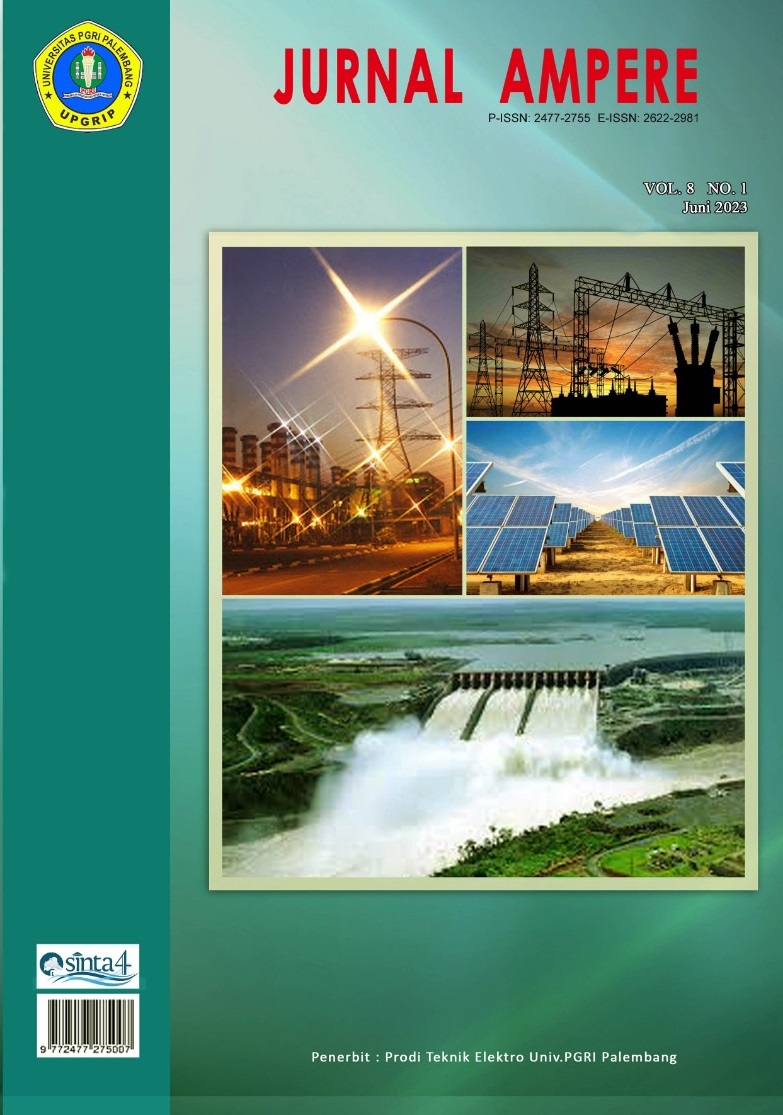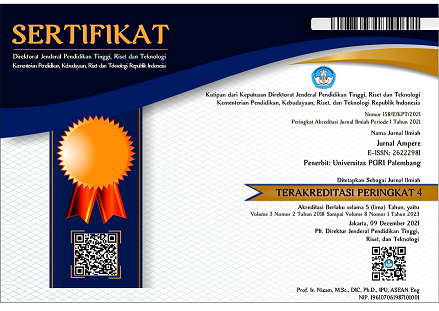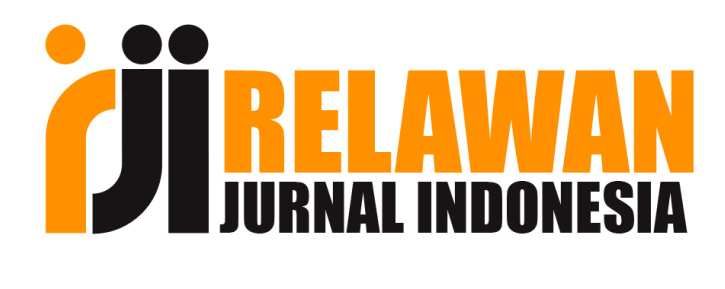Proteksi Motor Induksi Satu Fasa Terhadap Kenaikan Suhu Pada Pengering Maggot Berbasis Panel Surya
DOI:
https://doi.org/10.31851/ampere.v8i1.11539Keywords:
Panel Surya, Inverter, Motor Gearbox, SonoffAbstract
Electric motors are a very vital need in an industry, household and other needs. Electric motors that are often used in an industry are types of induction motors, where the induction machine is an electric motor that is very easy in its maintenance system so that this motor has the highest rating in its use system. In this study, using a single-phase induction motor as a maggot dryer is useful for making the maggot storage period longer and of high selling value. This study aims to protect the single-phase induction motor in the maggot drying system against temperature increase due to prolonged grinding using the DS18B20 sensor. So that the single-phase induction motor is able to work when the motor is unstable at the time of overcurrent. With the installation of the DS18B20 sensor, the single-phase induction motor will stop automatically when the given temperature setting has exceeded the limit set on the sonoff. With the protection system of this single-phase induction motor, it can maximize the performance of the electric motor in the maggot drying process and provide convenience in remote motor control and time setting on and off using the Internet of Things (IoT).
References
N. Suyoko, M. J. Afroni and B. M. B, "Sistem Pengaman dan Monitoring Motor Industri Satu Fasa Secara Online," Jurnal Universitas Islam Malang, pp. 1-7, 2019.
T. Hamdani, "Pengujian Karakteristik Motor Kapasitor Untuk Berbagai Nilai Kapasitansi," MEKTEK, vol. VII, no. 1, pp. 48-58, 2005.
A. Tukananto, Junaidi and Hardiansyah, "Rancang Bangun Sistem Proteksi Arus Lebih Motor 3 Fasa dengan Timer Start dan Trip," Jurnal Teknik Elektro Universitas Tanjungpura, vol. 2, no. 1, 2015.
A. K. A. Bahar and A. T. Maulana, "Perencanaan dan simulasi Sistem PLTS Off-Grid untuk Penerangan Gedung Fakultas Teknik UNKRIS," Jurnal Ilmiah Elektrokrisna, vol. 6, no. 3, pp. 97-107, 2018.
Habiburosid, W. Indrasari and R. Fadhiran, "Karakteristik Panel Surya Hybrid Berbasis Sensor INA219," Prosiding Seminar Nasional Fisika (E-Journal), vol. VIII, no. Desember, pp. 173-178, 2019.
K. E. d. S. D. M. R. Indonesia, "Solar Cell, Sumber Energi Terbarukan Masa Depan," 1 januari 2011. [Online]. Available: https://www.esdm.go.id/id/media-center/arsip-berita/solar-cell-sumber-energi-terbarukan-masa-depan.
T. Arief, S. Nasir, Nukman, Y. Ningsih, E. Oktinasari and R. Y. Bayuningsih, "Pengembangan Dan Modifikasi Kompor Surya Sederhana Berbasis Energi Matahari (Solar Energy) Tipe Bulat dan Parabola untuk Kebutuhan Memasak (Solar Cooker) pada Rumah Tangga dan Sekolah," Jurnal Pengabdian Community, vol. 3, no. 1, pp. 20-27, 2021.
M. SAPUTRA, "Perancangan Sistem Penerangan Gudang Barang Berbasis Internet of Things (IoT)," Universitas Muhammadiyah Sumatera Utara, Medan , 2020.
B. Setiawan, R. N. Wakidah, H. K. Safitri and M. Fauziah, "Regulator Panas untuk Mesin Tetas Hybrid dengan Metode Buck PID," Prosiding Sentrinov, vol. 3, pp. 79-100, 2017.
R. Annur, "Analisa Gear Box pada Fruit Elevator Pabrik Kelapa Sawit," Universitas Muhammadiyah Sumatera Utara, Medan , 2021.
Downloads
Published
How to Cite
Issue
Section
License
Copyright (c) 2023 Asri Indah Lestari, Sofiah, Yogie Ragil Pamungkas

This work is licensed under a Creative Commons Attribution-ShareAlike 4.0 International License.

Jurnal Ampere is licensed under a Creative Commons Attribution-ShareAlike 4.0 International License.
Authors who publish with this journal agree to the following terms:
- Authors retain copyright and grant the journal right of first publication with the work simultaneously licensed under a Creative Commons Attribution License that allows others to share the work with an acknowledgement of the work's authorship and initial publication in this journal.
- Authors are able to enter into separate, additional contractual arrangements for the non-exclusive distribution of the journal's published version of the work (e.g., post it to an institutional repository or publish it in a book), with an acknowledgement of its initial publication in this journal.
- Authors are permitted and encouraged to post their work online (e.g., in institutional repositories or on their website) prior to and during the submission process, as it can lead to productive exchanges, as well as earlier and greater citation of published work.






